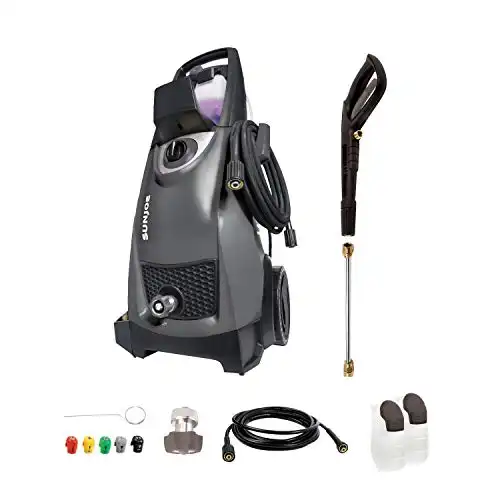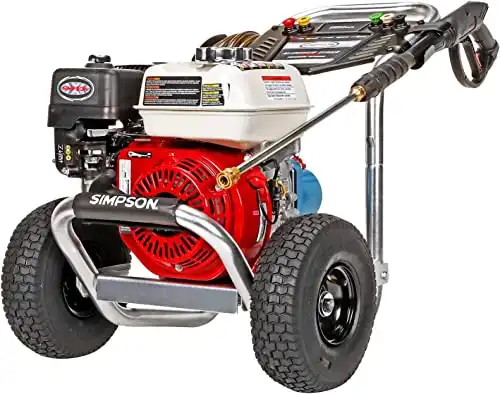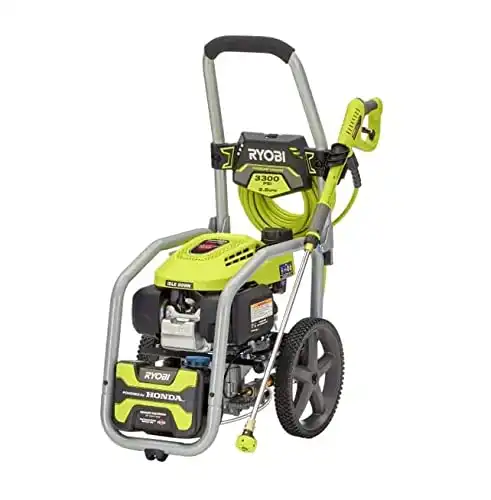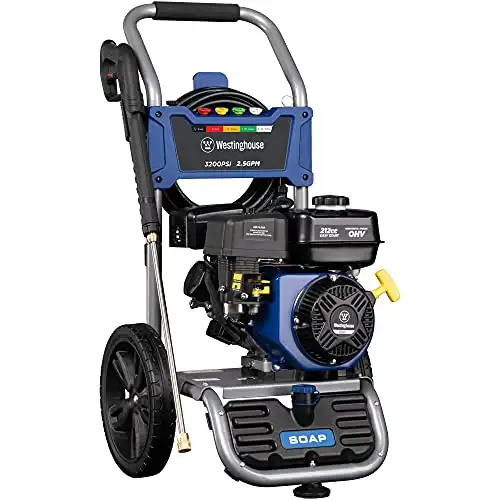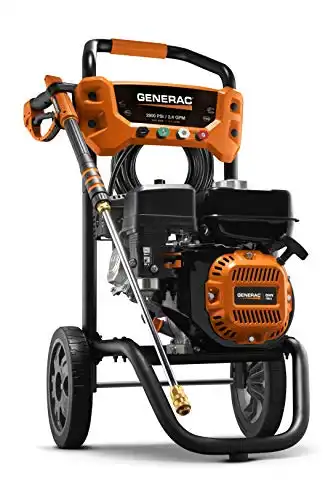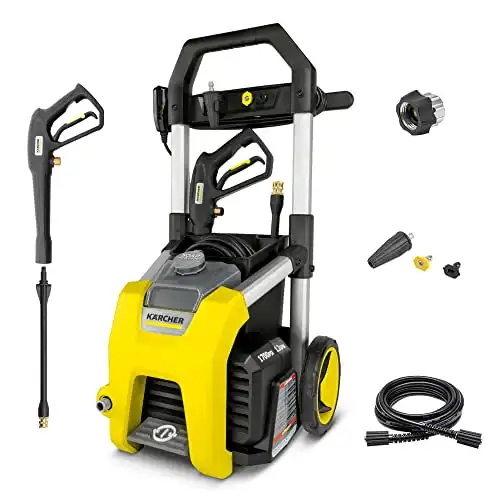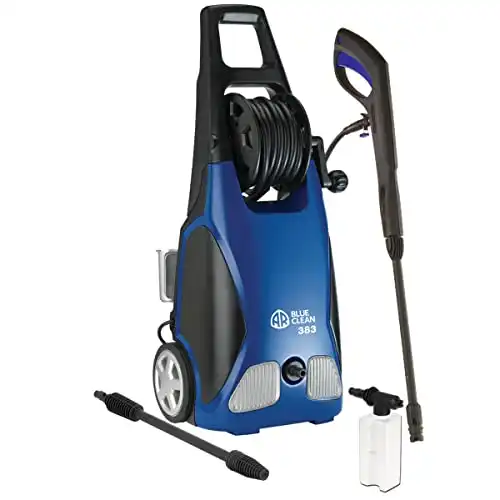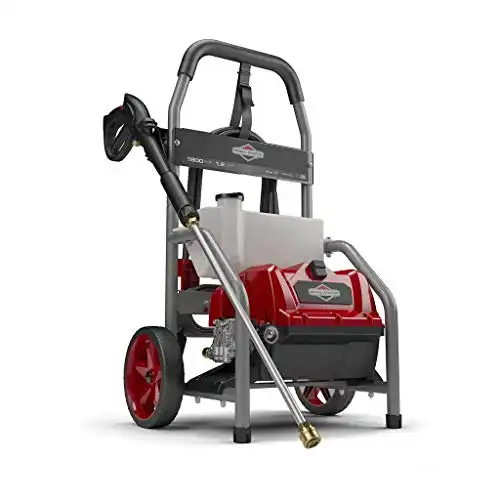Are you tired of scrubbing away dirt and grime? Have you been searching for an easier way to keep your outdoor space clean?
If so, then a pressure washer might be the tool for you! Here, we’ve rounded up the 10 best pressure washers available on Amazon.
|
|
|
|
|
$271.69
|
|
$829.99
|
1. Sun Joe Electric Pressure Washer
The Sun Joe SPX3000 Electric Pressure Washer is one of the best pressure washers you can find on Amazon.
It packs a punch with its 2,030 psi at 1.76 GPM, enough to make short work of any job you throw at it.
This affordable unit is ideal for decks, driveways, siding, and more, and it also comes with three quick-connect tips and 11.8 fl oz foam cannon for maximum cleaning power.
Plus, it’s a top-selling Amazon product in its category, so you can be sure that you are getting the best value for your money.
2. Greenworks TruBrushless Electric Pressure Washer
The Greenworks 3000 PSI Pressure Washer is one of the highest-performing electric pressure washers available on the market and PWMA CERTIFIED.
Powered by TRUBRUSHLESSTM motor technology, this powerful pressure washer can provide an impressive 1.1 GPM flow at 3000 PSI, making it ideal for washing cars, decks, and other outdoor surfaces.
It also comes with a detergent tank, 3000 Max PSI, and 2 GPM for even more cleaning power.
With its 2x cleaning power and superior performance, this electric pressure washer is sure to be a great addition to your outdoor cleaning tool arsenal.
3. SIMPSON Cleaning 3400 PSI Gas Pressure Washer
The Simpson Cleaning 3400 PSI Gas pressure washer is a great choice for those looking for a powerful and portable pressure washer.
It features an impressive 3400 PSI of power, and a 2.5 GPM rating, making it great for tackling tough cleaning tasks around the home.
The HONDA GX200 engine ensures reliable starting, and the included spray gun and extension wand make it easy to reach those hard-to-reach places.
Plus, the five quick-connect nozzle tips offer a range of cleaning options.
4. RYOBI 3300 PSI 2.5 GPM COLD WATER GAS PRESSURE WASHER
The Ryobi 3300-PSI 2.5-GPM Honda Gas Pressure Washer is one of the best options for most people.
With 3,300 PSI of force, it is powerful enough to tackle tough projects. This pressure washer features a powerful Gas Powered Motor and a 2.5 GPM flow rate.
It also has an adjustable spray wand that allows you to control the pressure and has a detergent tank to make cleaning easier.
It comes with a 25′ high-pressure hose, a surface cleaner, and a turbo nozzle for enhanced cleaning power.
This Ryobi is the perfect choice for homeowners who want a powerful pressure washer without breaking the bank.
5. Westinghouse WPX3200 Gas-Powered Pressure Washer
6. Westinghouse WPX3200 Gas-Powered Pressure Washer: This pressure washer packs a powerful punch.
Delivering 3200 PSI and 2.5 GPM of deep-cleaning water pressure, perfect for outdoor cleanings like decks, sidewalks, siding, fences, railings, garage floors, and more.
With an onboard soap tank and spray gun, you can easily apply soap to the surface for maximum cleaning power.
The Westinghouse WPX3200 is lightweight and easy to maneuver, making it an ideal choice for those looking for a great all-around gas pressure washer.
Customers have given it amazing ratings overall for its great performance and value.
6. Generac 8874 Pressure Washer
The Generac 8874 Pressure Washer is the perfect choice for residential and light commercial use.
It has an impressive 2,900 PSI and 2.4 GPM which provides plenty of power to tackle tough cleaning jobs.
The 50-State/CARB-compliant engine is reliable and easy to start, while the onboard detergent tank makes cleaning simple.
The pressure washer is also easy to maneuver due to its lightweight design. Additionally, several security features and onboard storage make it a great choice for anyone looking for a dependable pressure washer.
7. Karcher K1700 Electric Power Pressure Washer 1700 PSI
The Karcher K1700 Electric Power Pressure Washer 1700 PSI is a great choice for cleaning cars, decks, and outdoor surfaces.
It delivers 1700 PSI of TruPressure, ensuring you get the highest level of cleaning power, and is driven by a reliable universal motor.
With its convenient on/off foot switch, the Karcher K1700 also comes with a turbo nozzle for maximum cleaning power and an 11″ surface cleaner for larger surfaces.
It’s also lightweight and easy to maneuver at only 18 lbs. With its 3-year warranty and included detergent soap cleaner, this pressure washer is sure to deliver long-lasting performance.
8. AR Blue Clean Electric Pressure Washer
The AR Blue Clean AR383 1900 PSI Electric Pressure Washer is a great choice for those looking for an efficient, reliable, and powerful pressure washer.
This pressure washer has 50 years of pump-building experience through the Annovi Reverberi brand and features a classic design.
It offers an impressive range of features, including a 1.3 GPM flow rate, nozzles for different applications, a spray gun, and a detergent bottle and hose.
It is also easy to use with its quick connect feature, 15 and 25-degree nozzles, turbo nozzle, and foam sprayer.
With its impressive power and range of features, this pressure washer is sure to make any cleaning job easier.
9. Briggs & Stratton Electric Pressure Washer
The Briggs & Stratton S1800 1800 PSI 1.2 GPM Electric Pressure Washer is a great choice for those looking for a powerful yet compact machine.
It has a long-life Universal Motor and a maximum pressure of up to 1800 PSI, allowing you to clean with confidence. It also comes with a detergent tank and a 1.4 GPM flow rate for great results.
Its lightweight design makes it easy to move around, making it great for occasional home use.
Pressure Washer Buyers Guide
Commercial pressure washers are more affordable now, which makes them viable for non-professional use. Many homeowners are getting their own pressure washers to keep their properties clean.
However, since it is still a complex tool, many individuals are unsure of what to look for when purchasing one.
The water pressure, volume, and nozzle type are some basic specs you need to check. You’ll also need to decide whether to go gas or electrical.
Our pressure washer buying guide will help you figure out all those things.
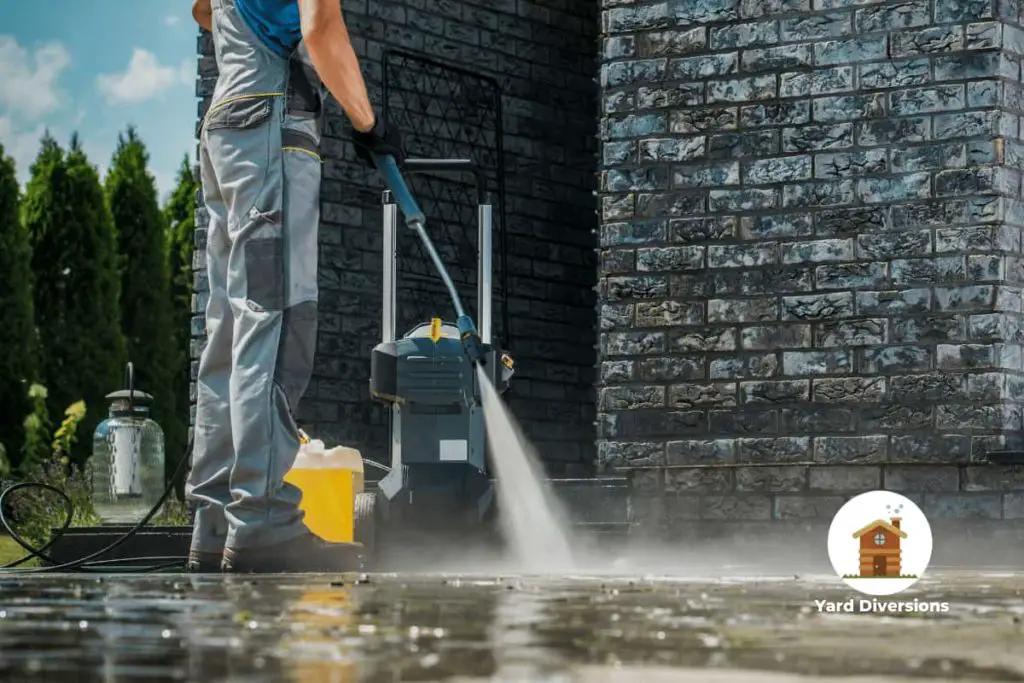
Pressure Washer Basic Info
Pressure washers pump out powerful jets of water to clean things. The mechanism that does the work is either a gas engine or an electric motor. They pump the water through a very thin nozzle to create high water pressure.
The nozzle concentrates the water and gives it its signature force. There are two main components to a pressure washer. The first component is the engine, or the electric motor, and the other part is the pump.
Pressure washers either have a triplex or an axial pump, the axial pump being the most common.
An axial pump is a lightweight pump with a compact design but they have a relatively shorter lifespan than triplex pumps.
Triplex pumps have a square body profile. These pumps are usually larger, and more durable compared to axial pumps, but they can get quite bulky, and heavy.
When buying a pressure washer, you should look for larger pumps. For both axial and triplex pumps, larger and heavier means more durable.
Vertical Vs. Horizontal Pressure Washer Coils
The coils are one of the key things you need to check while buying a pressure washer. Pressure washer coils come in two variants- horizontal coils, and vertical coils.
The coil orientation has little effect on the performance of a pressure washer. But it is one of the first things to consider when thinking about storage conditions.
Horizontal coils are generally better than vertical ones so you will find that most premium pressure washers come with horizontal coils.
The reason is that the coils trap moisture when exposed to rain. Vertical coils have a burner near the bottom of the mechanism. That design exposes it to the elements.
The horizontal coils have the burner higher. That makes it less likely to develop rust and cause malfunctions.
Horizontal coils also tend to have better insulation compared to their vertical counterparts.
Pressure Washer Specs
For the cleaning level of a pressure washer, you need to check three main specs. The first one is the water pressure, the second is the water volume, and the third one is the cleaning unit.
A pressure washer’s pressure is measured using PSI, which stands for pounds per square inch.
This represents the intensity of the water that comes out of the nozzle. Pressure washer PSI ranges from 1000 to 4000+ in most cases.
The water volume represents the amount of water the pressure washer uses. A more accurate way to describe it would be to call it the flow rate of the water that comes out of the nozzle.
This spec is measured using GPM or gallons per minute. The higher the GPM rating, the faster you can rinse a surface.
In layman’s terms, the PSI rating or the pressure of a pressure washer determines how fast it can separate grime from a surface.
The water volume of the GPM rating determines how fast it can rinse that away. Both these specs are crucial in determining the cleaning capacity of a pressure washer.
The cleaning unit is the multiplication of the PSI by GPM. This unit is used as a standard unit to measure the cleaning capability of a pressure washer.
But a machine with identical CU can have different cleaning effects. The pressure washer with a higher GPM will wash away dirt faster if you use a decent cleaning detergent to loosen it first.
PSI Requirement For Different Surfaces
Different surfaces need different pressure strengths to clean effectively. Using the wrong force can potentially damage the surface you’re working on.
This is why you don’t necessarily want to get the highest PSI or GPM rating.
A PSI rating of 1200 is enough for domestic use. This pressure is mild enough to clean cars, and lawn furniture, removing molds. The pressure washer patio level needs a PSI of around 1500.
2000 PSI is the starting range for cleaning concrete surfaces or very resilient stains. Cranking up to 3000 will give you industrial-grade performance. But most people won’t need that for general use.
Getting a higher GPM is good for cleaning faster, but that also uses more water. But the difference in water usage isn’t high enough to opt for a washer with less GPM.
Pressure Washer Nozzle Types
Pressure washers come with many different nozzle types. There are five main nozzle types used widely.
0-Degree nozzle: The 0 degrees nozzle has the most penetrative power among all the nozzle types. It’s where the water jet comes out in a thin straight line. This thin line has enough cutting power to drill holes in tough leather.
There are very few usage cases for the 0 degrees nozzle in a home setting. The other nozzles are just objectively better at cleaning any household surface. So non-professional users don’t even use this one.
There is one instance you can use it though. It comes in handy if you want to clean a place that’s too high for your regular nozzles to reach.
The blast from the 0 degrees nozzle is powerful enough to reach higher places.
15-Degrees Nozzle: The 15 degrees nozzle is less harmful and powerful than the 0-degree nozzle. But it is useful for cleaning rough concrete surfaces.
You can use it to remove tough stains and mold from hard surfaces. But it isn’t suitable for cleaning furniture and painted surfaces. It can chip out the paint if you have a high PSI setting.
25-Degree Nozzle: This is good for cleaning metal furniture.
40-Degree Nozzle: The 25-degree nozzle is usually the preferred choice for cleaning outdoor furniture. You can use it to clean wooden fences, patios, and other similar surfaces. This nozzle is safe for use on any surface.
65-Degree Nozzle: The 65-degree nozzle is usually the mildest spray mode. You can use this for general cleaning on any surface. People use this nozzle to wash cars too.
One-Tip: If you don’t want to go through the hassle of swapping nozzles all the time, try getting a washer with a one-tip.
The one-tip is a Single nozzle design that you can rotate between different settings. A one-tip generally has all the nozzle profiles listed above.
Nozzle attachments: Modern pressure washers can come with fancy nozzle types. These nozzles are for specific use only. Pressure washer patio attachments are one type of nozzle attachment for cleaning the patio. They usually come with a splash guard too.
Electric Vs. Gas Powered Pressure Washers
You will have to choose between a gas-powered pressure washer or an electric pressure washer. Both variants have their pros and cons.
However, the electric pressure washer is better for home use.
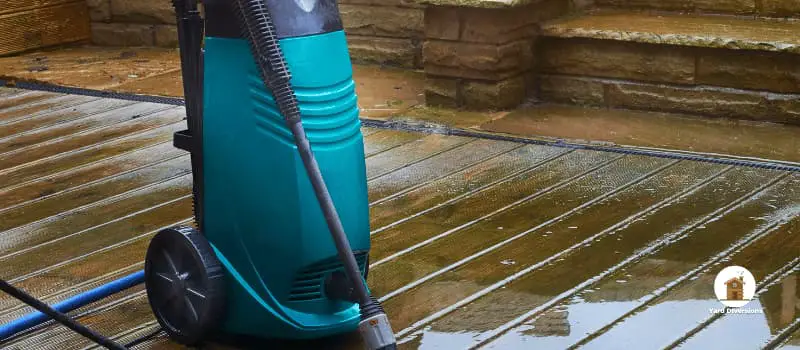
1. Electric Pressure Washer
Electric pressure washers are perfect for home use because they are more gentle. They have a powerful electric engine, but it does not make much noise.
The downside is that they don’t have as much water pressure as gas-powered ones. Electric pressure washers have a pressure range from 500 to 2000 PSI.
You can usually buy electric pressure washers at a far cheaper price than a gas ones. That makes it a viable affordable choice for home use.
They run on electricity, so you need a socket to plug them in. That also makes its range limited. You can only take it as far as the wire.
Never use an extension cord to try and extend the range though. The electric pressure washers are harder to repair too.
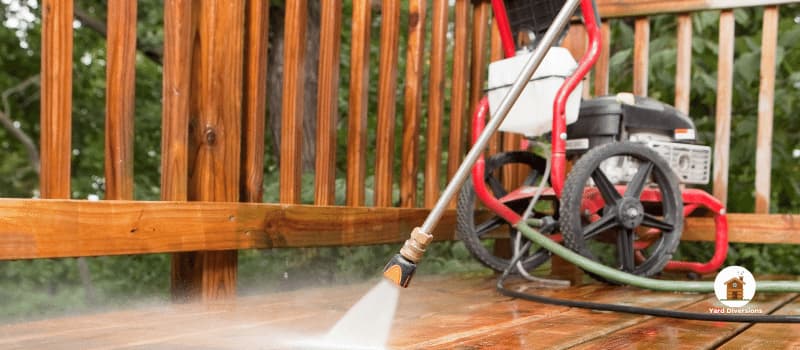
2. Gas-Powered
Gas-powered pressure washers are usually far more durable and powerful. At least compared to electric ones. They have a pressure range that starts at 2000 PSI all the way up to 4000.
That makes them perfect for heavy-duty cleaning— which isn’t necessary for home use.
Gas-powered pressure washers are also bulkier compared to electrical ones. They weigh more due to the metal components.
But these parts are easy to disassemble, clean, and repair, which makes them last longer, if gas suits you.
Gas-powered pressure washers are not eco-friendly. They emit carbon monoxide, so you should not use them indoors.
Gasoline is also not a good substance to store indoors. So you’ll need to store it at a place away from your home.
| Gas-Powered | Electric |
| Pros Better for light use Affordable Eco-friendly Pet-friendly Lower operating cost Lightweight Silent Engine Cons Lower water pressure Less durable Limited range | Pros Heavy-duty cleaning Portable(due to wheels) No limitations due to wire Durable Easy to repair Cons Very Heavy Noisy Produces toxic fumes Expensive High operation cost Strict Storage Conditions |
Hot Water Vs. Cold Water Pressure Washers
Hot water pressure washers and cold water pressure washers both have very distinct cleaning capacity differences.
Even two models with the exact same PSI, GPM, and CU will have very different cleaning efficiency.
Here’s how they are different:
1. Hot Water Pressure Washers
The hot water pressure washer has one extra stage compared to a cold water one. The high-pressure pump forces the water to pass through a heating coil.
The heating coil generates heat at the cost of more energy consumption, so using a hot water pressure washer has a higher operation cost.
This time, the performance difference is not due to the machine. The fundamental difference lies in the water itself.
Hot water is amazing at cleaning oil and grease. If you’ve ever done the dishes, this fact should be very clear to you.
Hot water is much faster at breaking down oil stains and some other stubborn spots. The hot water pressure washer also outperforms steam cleaners due to the water pressure.
Hot water creates heat agitation, which has much higher cleaning power when combined with soap. That’s something cold water can not provide.
2. Cold Water Pressure Washers
Cold water pressure washers or regular pressure washers are good at removing dirt and non-oily substances but they don’t outperform the hot water variant in any way.
But it is milder overall, and if the surface you are working on is sensitive to temperature, cold water is the way to go.
Conventional wisdom holds that hot water can do anything cold water can do, but better. Don’t get me wrong, cold water is fine for cleaning paint, patio, walls, etc, but hot water will objectively do a better job.
However, cold water pressure washers cost almost half of what a hot water pressure washer costs. The price difference is very significant.
So, decide whether spending the extra money is worth it for you or not.
Additional Features To Look For
Pressure washer accessories can help a lot with household cleaning. There are many accessories available, and chances are you won’t find all of them in a single unit.
You might have to buy them separately.
1. Specialized Nozzles
Some nozzles do very specific jobs, like the patio cleaner attachment. But there are multi-function nozzle accessories that can help you get a variety of different features.
Rotating spray nozzles are fantastic at cleaning dirt from the patio. Some nozzles let you change the pressure setting. You could also automize the use of detergent with specific nozzle types.
2. Wand Extender
Reach extenders are pretty self-explanatory. They extend the reach of your pressure washer. These extenders increase the wand’s length. So, you could reach the rooftop of a one-storied house.
Keep an eye out for the PSI limit while buying a wand extender.
3. Hose Extender
This is also a reach extender as it lets you go further than the machine. This accessory is very useful if you plan to buy an electric washer.
The electric washer needs to stay near the power source, but a longer hose will let you move around freely. Hose extenders are your only option for getting a more effective range.
Avoid using extension cords as those can not handle the power draw of a pressure washer.
4. On-board Detergent Tanks
Modern pressure washers usually have a detergent tank attached from the get-go. That removes the hassle of applying detergent manually.
You should take the initiative to buy some pressure washer-compatible cleaning agents too while you’re at it.
5. Pivot Coupler
Pivot couplers are very simple add-ons that help you change the nozzle direction. That is very useful for cleaning the underside of a car, or any other hard-to-reach place. Be careful while buying these though.
They have a clearly defined PSI load limit. Do not use a low PSI coupler with a higher-powered machine.
6. Gutter Cleaner
Gutter Cleaner attachments are U-shaped wands. Technically they function the same way as pivot couplers, but with more bend.
That is an ideal add-on for cleaning the eave’s gutters. Gutter cleaners are U-shaped wands that offer a lot more reach too.
7. Rotary Nozzles
The rotary nozzles are cleaning nozzles with large surface areas. They look like little Roombas attached to the wand.
They tend to have splash guards, and some models come with bristle cleaners. There are many variants of rotary nozzles on the market.
Most modern pressure washers should come with a free one.
Pressure Washer Safety Tips
Pressure washers are very powerful tools. In the wrong hands, they are far more deadly than a knife.
So, one must follow some safety rules to use this machine without causing harm to themselves and to others.
Here are some basic things you should keep in mind while using a pressure washer:
- Never turn the nozzle towards other people or animals. There’s a good chance it might kill them.
- Wear safety goggles while operating a pressure washer. Put on heavy-duty work boots and wear sturdy pants.
- It is easy to damage a cleaning surface with a strong jet of water. So always start with the nozzle far away from the surface. Slowly inch it closer until it starts to remove the stain.
- Use the widest spray nozzle you have. Only switch to narrower ones if they fail to clean.
- Drain excess water by turning off the engine and pressing the trigger. Do it after every use.
- Don’t use a pressure washer while standing on a slippery surface or a ladder. One mistake can cost you a trip to the ER.

